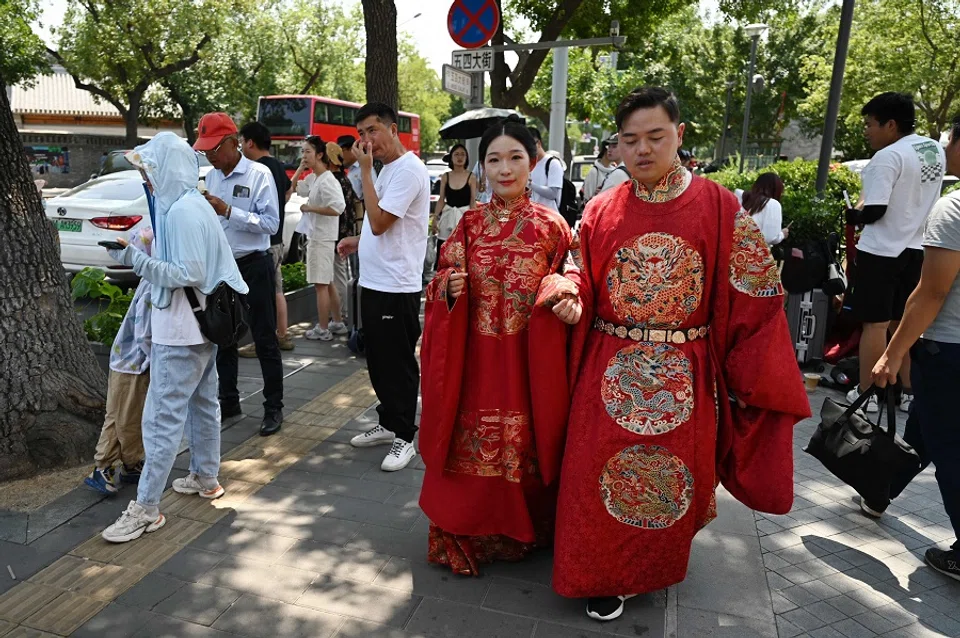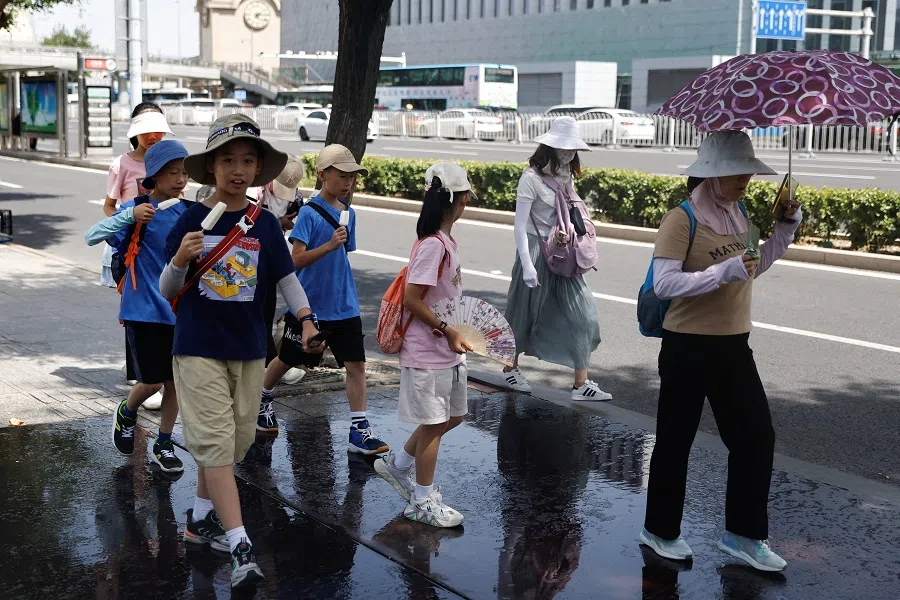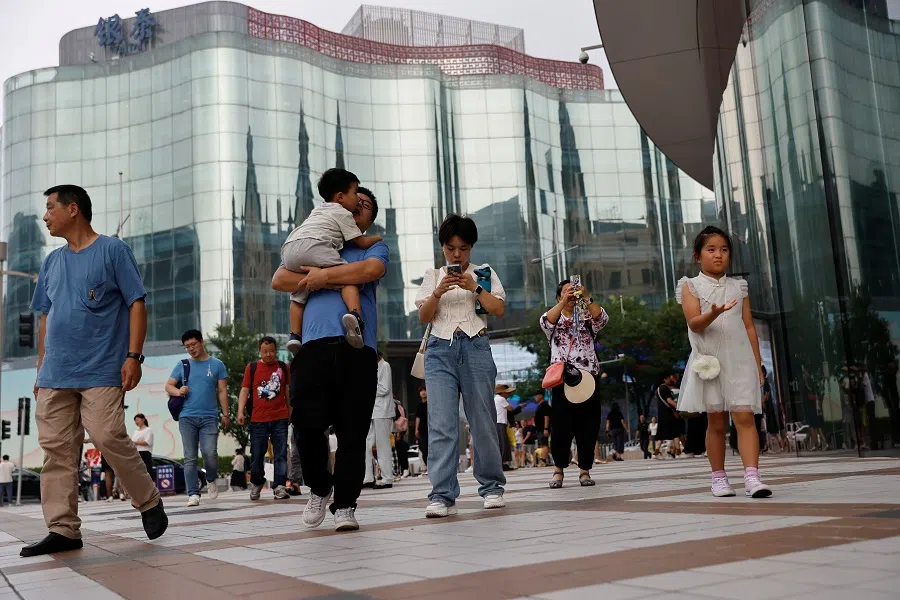Regular phone calls and cash incentives: China goes the extra mile to encourage childbirth
Local governments in Chinese cities are taking extra measures to encourage couples to marry early and have children. However, given the youth's shifting values and society's tolerance for singlehood, these measures are falling short. Meanwhile, netizens are lamenting that government policies should not be coercive or objectify women.

Amid China's falling birth rate, aside from implementing two- and three-child policies to encourage childbearing, the local governments are also ramping up efforts to get young people to get married.
On 24 August, in a bid to promote "age-appropriate marriage and childbearing", Zhejiang's Changshan county announced a cash reward of 1,000 RMB (US$137) for newlyweds if the bride is aged 25 or younger.
Elevating the responsibility of childbearing
Although China's minimum legal age for marriage is 22 for men and 20 for women, the statistical yearbook released in June 2022 showed that China's average age of first marriages in 2020 was 28.67, with the average age of Chinese men and women marrying for the first time at 29.38 and 27.95 respectively.
Changshan's policy is driven by the fact that Chinese couples are generally marrying later in life. But the policy faced backlash as soon as it was introduced, with related topics even topping the list for Weibo searches on 29 August.
Some netizens think that this is a typical example of "expecting big returns at little cost" and assert that "1,000 RMB does not solve the root cause of the problem".
Other netizens note, "Youths at 25 are only just graduating with a master's degree. How are they expected to get married without financial independence?"
The message read: "On the occasion of the Qixi Festival, here's wishing you sweet love, marriage and childbirth. Together we can create good fertility, continue the Chinese bloodline, and share the important task of rejuvenation!"

But more netizens are concerned that the men are not asked to marry early. They think that the policy is in fact targeting the issue of childbearing and the optimal age for women to have children. For them, the discussion is about whether childbearing is "a right or a responsibility of the women".
Addressing this, Xi'an officials not only confirmed the netizens' speculations but even elevated the responsibility of childbearing to the cause of "national rejuvenation" in a mobile message. In conjunction with the Qixi Festival (Chinese Valentine's Day) on 22 August, Xi'an's Health Commission and Family Planning Association sent a message to its residents encouraging them to get married and have children.
The message read: "On the occasion of the Qixi Festival, here's wishing you sweet love, marriage and childbirth. Together we can create good fertility, continue the Chinese bloodline, and share the important task of rejuvenation!"
Most netizens were appalled by the message, thinking that associating childbearing with national rejuvenation was just grasping at straws.
Some netizens believe that if officials are truly worried about the childbearing issue, more emphasis should be placed on youth employment, education and welfare, rather than "moral kidnapping" the young people with splashy values.
Wuhan University responded that different majors may have different schedules, and that "as long as hearts are together and the couple is together, love is in abundance whether it's one bed or two".

On 18 August, Wuhan University announced on WeChat that shared dormitory rooms would be available to married couples, in a subtle but practical attempt to encourage their students to have children.
But netizens were puzzled by photographs of the dormitory rooms, questioning the need for two separate beds if the occupants were a married couple.
Wuhan University responded that different majors may have different schedules, and that "as long as hearts are together and the couple is together, love is in abundance whether it's one bed or two".
Urging marriage and children
China abolished its longstanding one-child policy in 2015, allowing all couples to have up to two children. In 2021, China further relaxed birth restrictions, permitting couples to have up to three children.
However, eight years after the two-child policy was introduced, China instead witnessed its first population decline in 60 years in 2022, with the number of births falling from 10.62 million in 2021 to 9.56 million in 2022. The birth rate also fell from 7.52 in 2021 to 6.77 per 1,000 people in 2022, the lowest since 1950.
Last year, wedding registrations in China fell below 7 million, marking a decline for the ninth consecutive year and the lowest level since records began in 1986.

Based on statistics released in April, Guangdong, China's most populous province with a huge inflow of migrants, also recorded its first negative population growth in 40 years last year. In a bid to salvage the situation, Guangdong swiftly introduced a series of policies encouraging childbirth in June.
A 2021 survey by China's National Health Commission (NHC) found that the fertility intention of couples of childbearing age is on the decline. The average number of children that couples intend to have is 1.64 in 2021, down from 1.76 in 2017 and 1.73 in 2019. As the main drivers of childbirth, the post-90 and post-00 generations only had the intention of having 1.54 and 1.48 children respectively.
These statistics highlight that China's relaxed birth restrictions had little effect on the country's birth rate. At the same time, the marriage rate, which is closely linked to fertility, is also declining.
The number of first marriages in China began to steadily decline after peaking at 23.86 million in 2013, falling to 11.58 million in 2021. Last year, wedding registrations in China fell below 7 million, marking a decline for the ninth consecutive year and the lowest level since records began in 1986.

According to a 2021 marriage report by Chinese economist Ren Zeping, the more developed the region, the steeper the decline in marriage rate. In 2019, Shanghai, Zhejiang, Shandong, Guangdong, Fujian and Tianjin reported the lowest marriage rates across China.
Why are youths unwilling to get married?
The reason for the unwillingness to marry among youths in China can be seen in most countries facing demographic problems.
According to a marriage white paper released by jiayuan.com and iResearch Consulting Group in 2021, in terms of external, objective factors, youths are "unable to get married" because of the shortage of marriageable population, and financial and environmental constraints.
In terms of internal, subjective factors, youths "do not wish to get married" because of the pursuit of individualism, shifting values and society's tolerance for singlehood.

During a seminar on 10 June, Yuan Xin, vice-president of the China Population Association, said that shifting cultural attitudes is a major factor affecting the younger generation's desire to have children. He said that young people today prioritise personal development and enjoyment of life over having children; if having children hinders their goals, they would rather not have children or even get married.
What cards can China play?
Although various parts of China have introduced policies encouraging couples to have a second or third child, including cash rewards, one-off subsidies and preferential housing measures, they have had little effect so far.
Judging from the experience of other countries with demographic problems, relying on economic stimulus alone to encourage childbirth is far from enough.
Amid the severe demographic challenges, Chinese public opinion has also recently engaged in the widespread discussion of egg freezing, which is not available to healthy unmarried women.
... the local government called the newlyweds, urging them to get pregnant within a year, and as part of the work KPI, the officials will "check in with a phone call every quarter".

Caixin reported that the NHC was asking for experts' opinions on loosening the egg freezing policy for single women in March this year, sparking huge interest in related topics, which may see some breakthroughs.
However, others are worried that lifting restrictions on egg freezing for single women will only delay women's childbearing age, making them feel more comfortable with postponing marriage and childbirth.
Compared with the uncertainties surrounding the relaxation of egg freezing policies, another hard-line method has sparked greater controversy.
In a Weibo post last October, a Nanjing netizen described a colleague's experience wherein the local government called the newlyweds, urging them to get pregnant within a year, and as part of the work KPI, the officials will "check in with a phone call every quarter".
The netizen called this a "terrifying" move, and many netizens also left comments saying they had similar experiences, but the post was quickly deleted.
Fine for not having children?
Although officials did not claim the use of such tactics, some Chinese regions have indeed issued documents encouraging residents to get married.
In 2021, Jiangxi's Yihuang county introduced a series of policies encouraging older female cadres and workers to get married by offering a one-time housing subsidy of 30,000 RMB.
Some netizens asked warily, "Will we be fined if we don't get pregnant after getting married?"

The policy document stressed that "the phenomenon of 'older young female cadres and workers' remaining single in our county has become a very prominent problem". This drew the ire of netizens who asserted that older women not getting married is not a social problem - treating it as one is.
Some netizens asked warily, "Will we be fined if we don't get pregnant after getting married?" Other netizens even predicted, "Will this become a chain reaction that starts from civil servants?"
As the declining fertility rate caused by staying single and late marriages will pose enormous pressure on the demographic structure of Chinese society, the government cannot sit idly by. However, policies should also be introduced on the basis of voluntariness, equality and respect for the individual's will.
If the pursuit of childbearing leads to moral kidnapping, inflexibility or even the objectification of women, it will only lead to more resentment or even be counterproductive.
This article was first published in Lianhe Zaobao as "花式催婚出新招?25岁及以下新娘有奖".
Related: Egg freezing in China: A woman's right to have control over her body | Desperate parents gather in China's latest matchmaking park for the sake of their kids | A woman's right to freeze her eggs: Chinese society debates | China is cracking down on exorbitant bride price rates to save marriages | China's marriage, divorce and birth rates are falling

![[Big read] Paying for pleasure: Chinese women indulge in handsome male hosts](https://cassette.sphdigital.com.sg/image/thinkchina/c2cf352c4d2ed7e9531e3525a2bd965a52dc4e85ccc026bc16515baab02389ab)



